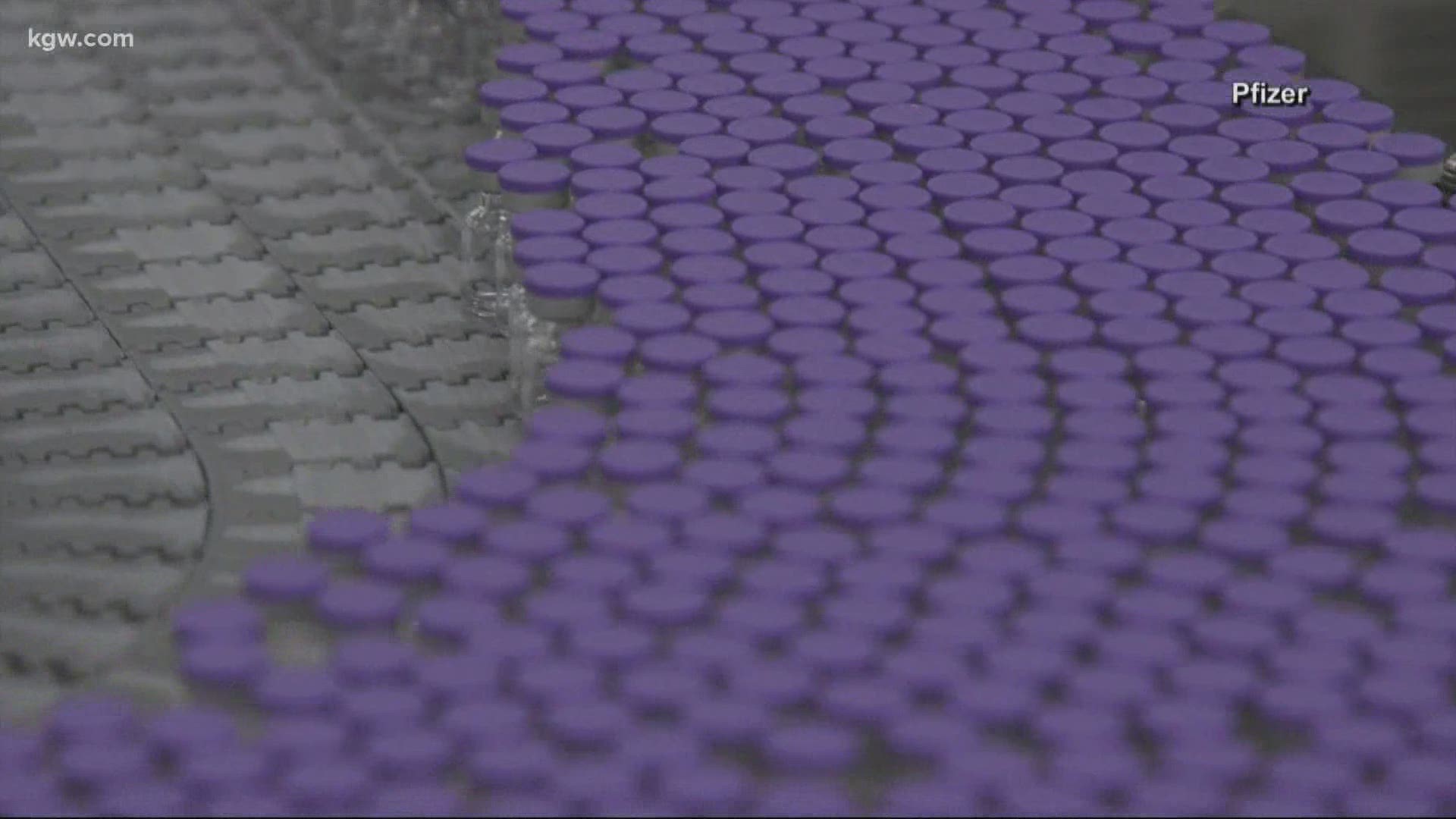PORTLAND, Ore. — The long wait to get the COVID-19 vaccine is nearing its end, with both the Pfizer and Moderna vaccines on track to get emergency use authorization from the U.S. Food and Drug Administration (FDA).
But once you get that first shot, the wait to be immune is not over. Both leading vaccines require a second dose. Pfizer requires doses be taken three weeks apart and Moderna requires four weeks between doses.
For Pfizer, according to documents published by the FDA ahead of a Thursday advisory meeting, the vaccine does offer strong protection (about 53% efficacy) against COVID-19 within about 10 days after the first dose.
But it is unclear how long this protection will last, underscoring the importance of getting the second dose that brings the efficacy rate to near 95% after seven days of inoculation.
“The first dose is there to train the immune system,” said Mark Slifka, a professor and vaccine researcher at Oregon Health and Science University (OHSU). “You really need that second dose to boost the immune system to its highest peak levels to give you the most durable immunity.”
The population may even need a third “booster” dose of the vaccine later on, Slifka said, but researchers have yet to conclude how long the two-dose vaccine will provide immunity.
We may eventually have a one-dose vaccine. Johnson & Johnson has been developing one, but they won’t seek FDA approval until next year at the earliest.
It is relatively common for vaccines to require two or more doses to boost immunity. For example, both the chicken pox vaccine and the measles, mumps and rubella (MMR) vaccine require two doses. Many children's vaccines, like the tetanus shot, even require three doses.
But studies show that people aren’t good at going back for that second or third shot.
In both the U.S. and the U.K., studies on the hepatitis B vaccine — which requires about a month between the two doses, like the COVID-19 vaccines — found that about 50% of patients failed to get their second shot within a year after their first.
And the hepatitis B vaccine does not even cause meaningful side effects. The coronavirus vaccines, on the other hand, are known to cause mild to moderate symptoms. Vaccine trial participants may experience flu-like symptoms like fatigue, muscle pain, fever or chills for a day or two after receiving the shot. People typically experience more symptoms after receiving the second dose, studies show. And for a small percentage or people, the flu-like symptoms can be more severe, though this is rare.
Mark Fendrick, a medical school professor at the University of Michigan, told CBS News that as much as 30% of the population could not get the second dose of the COVID-19 vaccine.
This is based on the fact that no-show rates for medical appointments can be as high as 30%, coupled with the symptoms associated with the vaccines and rampant conspiracy theories.
But Slifka, at OHSU, is much more confident people will come back for that second dose. He said that, in trials, participants rarely missed that second dose.
“So, if that first dose was horrible, they wouldn't have come back for a second dose,” he said. “So, most people are able to tolerate it.”
This vaccine is also being administered during a deadly pandemic, so people may be more motivated to get both doses.
But what will happen if people only get one dose of the vaccine?
These people will not have as high a chance of being protected against COVID-19. This makes it more difficult for the population to gain herd immunity, where 70% of the population is immune to the virus.
If millions of people only get one dose of a two-dose vaccine, the virus could also be more likely to mutate and become vaccine-resistant, health experts said. People need to get both doses soon to eliminate the virus before it mutates.
So, how does the government plan to remind people to get two doses?
The Centers for Disease Control and Prevention (CDC) currently plans to rely on an index card to remind people to get their second doses.
Millions of these cards will be shipped with other vaccine supplies to hospitals and other distribution centers. Medical providers will be tasked with filling out the card with a reminder of the patient’s appointment for a second dose.
The CDC also encourages providers to tell patients to take a picture of the card, in case it gets lost. The federal government does have a vaccine tracking system that could send email and text reminders, though that system was built for patients to report side effects, not to remind them of appointments.
In the absence of a federal reminder system, it is left up to individual medical providers and states to ensure patients come back for a second dose.
According to Oregon’s draft vaccination plan, the state will employ its own methods to ensure timely second dose reminders.
Oregon already has a statewide immunization record system, which officials use to remind patients by mail when immunizations are due. This system is typically used for childhood vaccines, but the state is adapting it for the coronavirus vaccine.
The state will also encourage providers to employ their own electronic reminder system and use the federal reminder cards.
Though challenges lie ahead in distributing the vaccine and ensuring everyone gets two doses, Slifka, from OHSU, emphasized the challenges vaccine manufacturers have overcome thus far.
“Take a look at the challenges involved with taking a vaccine from concept all the way through clinical trials and now being able to utilize that in the community during a pandemic,” he said. “It’s absolutely remarkable.”

